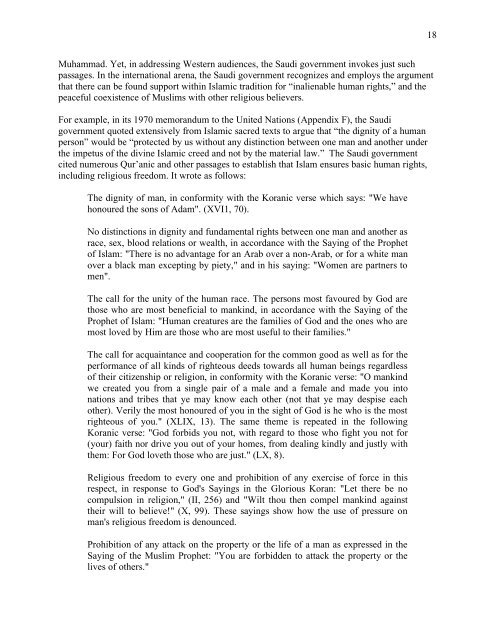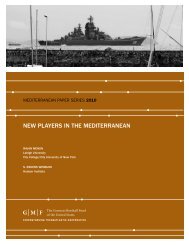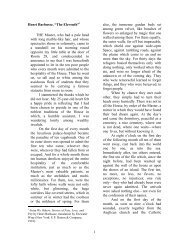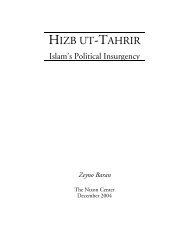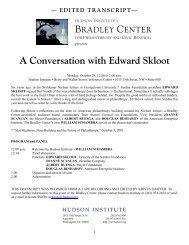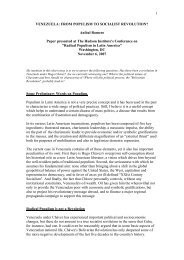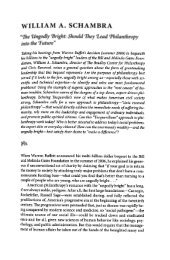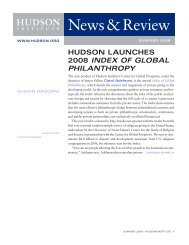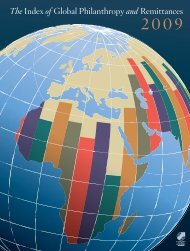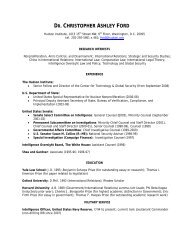Saudi Arabia's Curriculum of Intolerance - Hudson Institute
Saudi Arabia's Curriculum of Intolerance - Hudson Institute
Saudi Arabia's Curriculum of Intolerance - Hudson Institute
Create successful ePaper yourself
Turn your PDF publications into a flip-book with our unique Google optimized e-Paper software.
18<br />
Muhammad. Yet, in addressing Western audiences, the <strong>Saudi</strong> government invokes just such<br />
passages. In the international arena, the <strong>Saudi</strong> government recognizes and employs the argument<br />
that there can be found support within Islamic tradition for “inalienable human rights,” and the<br />
peaceful coexistence <strong>of</strong> Muslims with other religious believers.<br />
For example, in its 1970 memorandum to the United Nations (Appendix F), the <strong>Saudi</strong><br />
government quoted extensively from Islamic sacred texts to argue that “the dignity <strong>of</strong> a human<br />
person” would be “protected by us without any distinction between one man and another under<br />
the impetus <strong>of</strong> the divine Islamic creed and not by the material law.” The <strong>Saudi</strong> government<br />
cited numerous Qur’anic and other passages to establish that Islam ensures basic human rights,<br />
including religious freedom. It wrote as follows:<br />
The dignity <strong>of</strong> man, in conformity with the Koranic verse which says: "We have<br />
honoured the sons <strong>of</strong> Adam". (XVI1, 70).<br />
No distinctions in dignity and fundamental rights between one man and another as<br />
race, sex, blood relations or wealth, in accordance with the Saying <strong>of</strong> the Prophet<br />
<strong>of</strong> Islam: "There is no advantage for an Arab over a non-Arab, or for a white man<br />
over a black man excepting by piety," and in his saying: "Women are partners to<br />
men".<br />
The call for the unity <strong>of</strong> the human race. The persons most favoured by God are<br />
those who are most beneficial to mankind, in accordance with the Saying <strong>of</strong> the<br />
Prophet <strong>of</strong> Islam: "Human creatures are the families <strong>of</strong> God and the ones who are<br />
most loved by Him are those who are most useful to their families."<br />
The call for acquaintance and cooperation for the common good as well as for the<br />
performance <strong>of</strong> all kinds <strong>of</strong> righteous deeds towards all human beings regardless<br />
<strong>of</strong> their citizenship or religion, in conformity with the Koranic verse: "O mankind<br />
we created you from a single pair <strong>of</strong> a male and a female and made you into<br />
nations and tribes that ye may know each other (not that ye may despise each<br />
other). Verily the most honoured <strong>of</strong> you in the sight <strong>of</strong> God is he who is the most<br />
righteous <strong>of</strong> you." (XLIX, 13). The same theme is repeated in the following<br />
Koranic verse: "God forbids you not, with regard to those who fight you not for<br />
(your) faith nor drive you out <strong>of</strong> your homes, from dealing kindly and justly with<br />
them: For God loveth those who are just." (LX, 8).<br />
Religious freedom to every one and prohibition <strong>of</strong> any exercise <strong>of</strong> force in this<br />
respect, in response to God's Sayings in the Glorious Koran: "Let there be no<br />
compulsion in religion," (II, 256) and "Wilt thou then compel mankind against<br />
their will to believe!" (X, 99). These sayings show how the use <strong>of</strong> pressure on<br />
man's religious freedom is denounced.<br />
Prohibition <strong>of</strong> any attack on the property or the life <strong>of</strong> a man as expressed in the<br />
Saying <strong>of</strong> the Muslim Prophet: "You are forbidden to attack the property or the<br />
lives <strong>of</strong> others."


